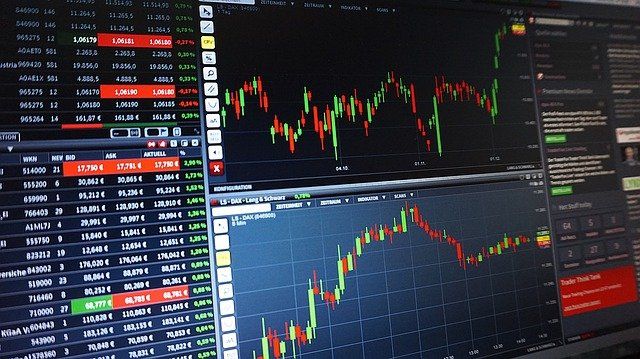The Future of Stocks: A Tech-Driven Revolution in Trading
The future of stocks is secure with advanced solutions like AI, blockchain, and algorithmic trading. These advancements offer opportunities for traders and investors in this dynamic landscape. Join us on a journey through the exciting developments that are redefining the stock market potential.

In an epoch where technology reigns supreme, it is imperative to fathom the trajectory that stock trading will chart in the days to come. The intersection of technology and stock trading carries profound implications, heralding a departure from conventional wisdom and unveiling novel vistas of opportunity.
1. The Role of Artificial Intelligence
Artificial Intelligence (AI), once relegated to the realms of science fiction, has emerged as the linchpin in the analysis of the most active stocks. These AI juggernauts wield the power to swiftly digest vast troves of data, discerning patterns and insights that may elude their human counterparts.
Predictive Analytics and Machine Learning
Within the sprawling domain of artificial intelligence, a formidable facet known as machine learning (ML) stands tall. ML models, steeped in historical data, are entrusted with the mantle of predicting market fluctuations. As these models ingest an ever-increasing corpus of data, their predictive prowess grows, bequeathing traders with a coveted competitive edge.
Robo-Advisors and Their Impact
AI-driven entities, colloquially referred to as robo-advisors, usher in a paradigm shift in the dissemination of investment counsel. Operating with minimal human intervention, these algorithmic marvels democratize the accessibility of financial acumen. Their algorithms proffer tailored investment strategies, sculpted in harmony with the idiosyncratic financial aspirations and risk thresholds of each individual.

2. The Impact of Big Data
The stock market is a goldmine of data. Traders are increasingly using big data tools to:
- Analyze market sentiments from social media.
- Track real-time stock movements.
- Understand macroeconomic indicators. This granular level of detail helps traders devise more nuanced and responsive strategies.
Data Analytics in Stock Market Predictions
Investment professionals now use advanced analytics to forecast stock trends. Algorithms can find hidden relationships by sorting through gigabytes of data, enabling better financial choices.
Privacy Concerns and Data Security
As reliance on data grows, so do concerns about privacy breaches and cyber threats. Financial institutions invest heavily in cybersecurity, ensuring data integrity and protecting sensitive investor information.
3. Quantum Computing in Finance
Quantum computers, equipped with their capacity to execute intricate calculations at the speed of thought, harbor monumental promise. Within the realm of stock trading, they possess the potential to decipher encrypted data swiftly or optimize extensive portfolios within mere seconds, eclipsing the plodding pace of traditional computing paradigms.
Quantum Algorithms and Their Applications
These algorithms, hinged upon the bedrock of quantum mechanics, unfurl the potential to unravel erstwhile insurmountable conundrums. In the context of finance, their utility extends to refining the modeling of market dynamics, ushering in a new era of precision, or forecasting the likelihood of rare and elusive market occurrences.
4. Sustainable Investing
Environmental, Social, and Governance (ESG) criteria have ascended to prominence within the realm of stock curation. Investors increasingly find themselves aligning their portfolios with ethical and sustainable tenets, driven both by moral imperatives and the promise of enduring returns.
Green and Ethical Investing
Decentralized Finance, colloquially known as DeFi, marks a paradigm shift from the conventional bastions of banking to a blockchain-fueled model. Sidestepping intermediaries, DeFi platforms proffer an array of financial services, encompassing lending and trading, in a direct participant-to-participant format.
5. Decentralized Finance
The ascent of DeFi begets a challenge to the time-honored conventions of traditional finance. By dishing out superior returns, heightened transparency, and mitigated fees, DeFi platforms beckon investors, potentially metamorphosing the modus operandi of global financial transactions.

DeFi's Impact on Traditional Finance
The rise of DeFi challenges the conventions of traditional finance. By offering higher returns, more transparency, and reduced fees, DeFi platforms lure investors and may reshape how financial transactions are conducted globally.
Risks and Rewards of DeFi Investments
Notwithstanding its robust potential, DeFi is not bereft of perils. Oscillations in prices, vulnerabilities embedded in smart contracts, and the nebulous domain of regulatory oversight should be meticulously weighed against the prospects of reaping gains.
6. Globalization and Stock Markets
Modern stock trading transcends the bounds of geography. Advanced platforms and digital tools orchestrate seamless cross-border exchanges, endowing investors with untrammeled access to global markets and diversified investment portfolios.
International Stock Exchanges
As emerging markets mature, stock exchanges spanning the gamut from Shanghai to Johannesburg ascend as pivotal actors on the global stage, offering an amalgamation of prospects and conundrums.
Emerging Markets and Opportunities
Nations marked by burgeoning economies proffer tantalizing investment vistas. Yet, they are also veritable crucibles of distinctive risks, entwined with the labyrinthine corridors of political stability, currency vicissitudes, and indigenous regulatory paradigms.
Future Regulatory Trends
In the expanses of an expanding global stock trading vista, the harmonization of regulatory frameworks assumes paramount significance. Collaborative international efforts may pave the path toward standardized norms, ensuring the safeguarding of investor interests and the preservation of market integrity.
7. Investment Strategies for the Future
Long-term vs. Short-term Strategies
The tempestuous tides of technological evolution mandate a recalibration of investment blueprints. While short-term strategies seize upon market volatility, their long-term counterparts confer stability, an invaluable anchor in the tumultuous seas of a technology-driven market milieu.
Diversification in the Tech-Driven Era
In a milieu brimming with technological innovations, the imperative of diversification across sectors and asset classes assumes unprecedented urgency. This diversification stands as a bulwark, resolutely guarding against unforeseen disruptions.
Tactical Asset Allocation in a Dynamic Market
The dynamic contours of market landscapes and economic trends underscore the growing importance of tactical asset allocation. This strategic maneuver empowers investors to optimize returns while adroitly managing the crucible of risk.
The Future of Stocks
As we navigate the labyrinth of modern stock trading, it's clear that technology acts both as a beacon and a disruptor. From AI to DeFi, these innovations reshape investment strategies, democratize finance, and challenge existing norms. However, with opportunities come risks. The future landscape of stock trading will be marked by continuous learning, adaptation, and a delicate balance between innovation and prudence. Investors, proactive in embracing and understanding these changes, will be instrumental in shaping a prosperous financial future.

